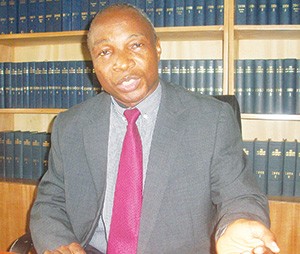Ade Oyebanji studied Law at the University of Lagos and was called to the Bar in 1985. He was a part-time lecturer in Business Law at the Federal Polytechnic Ilaro, Ogun State, and currently the Managing Partner of Ade Oyebanji & Co. In this interview with Senior Correspondent, ONYEWUCHI OJINNAKA, he speaks on the recent controversial visit of Rivers State Governor to the CJ, the kind of judiciary expected in the new administration, among others.
What is your position on the controversy trailing the visit of Rivers State Governor Nyesom Wike to Chief Justice of Nigeria?
We should look at the issue holistically, particularly from the point of view of the governor, the party that is contesting the governorship election in Rivers State and the concerns of the reading public who are not lawyers. The governor came to power on May 29. Before his assumption of office, the judiciary in Rivers was in a shambles. The position of the acting Chief Judge could not be filled as a result of power tussle between the former governor and members of the House of Assembly.
Unfortunately, government functionaries, including the former governor, frustrated all attempts by the National Judicial Council (NJC) to ensure that the most senior judicial officer in the state attains that position. But after the expiration of that government, a new acting chief judge emerged. You also recalled that before Governor Wike was sworn in as governor, a directive has to be issued by the then Attorney-General of the Federation that the Chief Judge of Bayelsa State should swear in the governor. So, we are talking about Rivers that is not on the track or on the same platform with other states in the country. We are talking of a situation that has been hopelessly damaged by the immediate past administration.
An acting Chief Judge cannot hold office more than a period of three months. The explanation of the governor is that he wanted to know what would happen at the expiration of the three months. However, my grouse with the governor is that all these could have been done by a formal letter and the CJN would have replied in line with the constitution. But, I do not see the visit of the governor beyond an ordinary official visit, because the visit of the governor to the CJN was done during working hours. It was done in the office of the Chief Justice, whether the CJN was available or not is another matter entirely. If there is a clandestine move for the purpose of covering up on the ongoing election petition matter before the tribunal, the governor would not have ventured to see the CJN in his official office, at official time and in the presence of people.
What kind of judiciary would you like to see in the administration of President Muhammadu Buhari?
I expect a virile judiciary in the administration of President Muhammadu Buhari. The judiciary performed creditably under the dispensation of former President Goodluck Jonathan, particularly when it comes to the issue of election petition. The only amendment I wish could take place on this issue is the timing or timeframe within which election petition could be heard and determined. This is because I think it is gross injustice to deny a candidate access to the court for no fault of his, but because of a particular timeframe that has been engraved in the Electoral Act. There are other areas which I feel the president should look into. One of such has to do with the remuneration of judicial officers which, in my view, is far below expectation. Under the administration of Jonathan, though I do not have the statistics, what we heard was that a member of the House of Representatives was earning as much as N16 million, while the senators were earning N20 million monthly.
This statistics was brought out by the former Central Bank of Nigeria (CBN) Governor, Sanusi Lamido. After this statistics, there was an upgrade and an enhancement in the remuneration of the National Assembly members. Ostensibly, they should be earning more than N16 million and N20 million respectively now. With this, I think a serving judge should be earning nothing less than N5 million monthly. At the moment, there is no judge in any state of the federation that earns up to N3 million, even with all the allowances. I can say it anywhere.
There should be a standard; otherwise lawyers will like to become politicians, instead of aspiring to be judges. In fact, if the allowances of the National Assembly could be pegged down to the same salary that a permanent secretary or a director-general in a ministry earns, it will make it less competitive and volatile. At present, it is the urge for the money in the system that is causing desperation and violent conducts among politicians in the quest to attain positions.
Do you support the call for decentralisation of the Supreme Court?
My point of view on this issue is that we should not sacrifice quality on the altar of speed. The reason is that Supreme Court is the apex court. When you are ruled against at the Supreme Court, you will appeal to no one except God. However, I want you to take note that the delay we are experiencing in the dispensation of justice is not caused by the Supreme Court; it is about the lower courts. I think the issue of one man sitting as a judge at the high court should be reviewed. One man that sits at the High Court is like the Supreme Court on its own, and that is the challenge. But if there is a review of the composition of the judges sitting at the high court to about three, then it will go a long way in helping the judiciary.
If that is done, then, there should be divisions of the high court. I am not talking of what we have presently in Lagos State as a commercial division of the high court where so many things are lacking.
Do you support the creation of special courts to adjudicate on corruption cases?
On the plan by the Buhari government to set up special courts to handle corruption cases, it should be remembered that we are in a democratic dispensation. There are courts that are recognised under the constitution; so, setting up special courts, particularly those ones that will violate constitutional rights, will be most unacceptable to any legal mind. We should know that it is not that the judicial system of the country is not capable of combating corruption. But right from the point of arrest, a man can either decide to make or lose a case.
That means, because of vested interest, somebody can decide to see that a case either succeeds or fails. There are various loopholes that should be looked into in the fight against corruption, not only in the judiciary but also in the prison system. We have seen cases in the newspapers where some people are serving the sentences of other people. Do not also forget that a judge will have to look at the evidences before him and he cannot manufacture one.
So, it is very important that we strengthen the prosecution and law enforcement agencies. We can also use information technology to nip some of the corruption issues in the bud. We can do this with the aid of forensics and other measures used in advanced countries. For instance, in the United States (U.S.), they allow you to commit an offence, they follow you up, they get you and at the end of the day you cannot escape it. This is because the information is at their fingertips. Regulations for the fight against corruption is already in place, what is needed is their implementation.
The Economic and Financial Crimes Commission (EFCC), Independent Corrupt Prcatices and other related offences Commission (ICPC), the Nigeria Police Force and all other security agencies are already in place. But there are so many loopholes. For instance, nobody is even talking about Customs in all these things. People are crying and begging to pay for Customs duties that originally they were not supposed to pay. Particularly, when you are begging to corrupt an officer, he will readily make himself available, because he knows that if you are to pay the right amount, you may not be able to afford it. So, some of these things need to be looked at if we are indeed serious about fighting corruption in Nigeria. It is not a question of coming up with new legislations. We have them already. These legislations have been copied from somewhere and they are working there.














